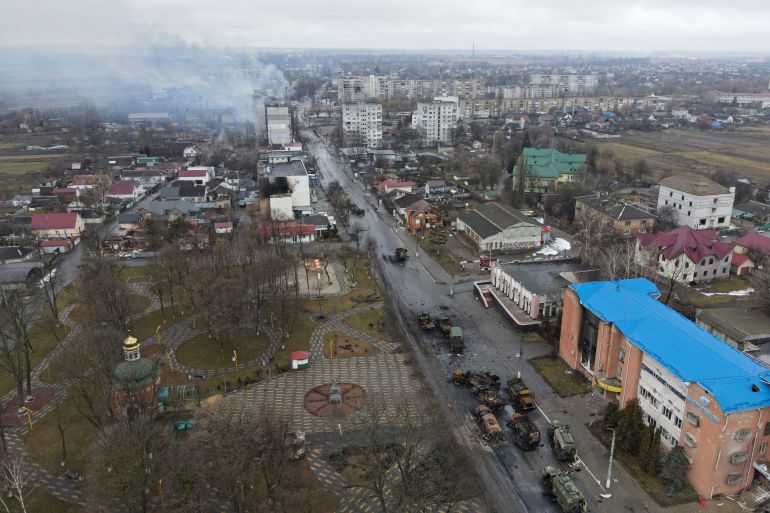Russia-Ukraine war: CNN, Bloomberg suspend work in Moscow
Decisions follow similar moves by BBC, ABC, CBC after Russia approved a new law punishing ‘fake news’ by up to 15 years.

CNN and Bloomberg News have become the latest global media outlets to suspend their operations in Russia after President Vladimir Putin signed into law a new bill that punishes the spreading of “fake news” with jail terms of up to 15 years.
CNN said on Friday that it was halting broadcasting in Russia as it continues “to evaluate the situation and our next steps forward”, while Bloomberg said it was temporarily suspending news gathering in the country.
Keep reading
list of 4 itemsRussia, Ukraine trade barbs at UN over nuclear plant attack
How US right-wing views Putin amid Russian war on Ukraine
US: Ukraine has ‘significant majority’ of its military aircraft
The decisions follow similar moves earlier by BBC, ABC, CBS News and Canada’s CBC/Radio-Canada.
Bloomberg’s Editor-in-Chief John Micklethwait said he greatly regretted the suspension.
But “the change to the criminal code, which seems designed to turn any independent reporter into a criminal purely by association, makes it impossible to continue any semblance of normal journalism inside the country,” he said.
“We will not do that to our reporters.”
The legal changes came after Russia’s invasion of Ukraine drew near-universal condemnation, as well as global sanctions, including a ban on Russian news network RT in many Western nations for what the European Union called systematic disinformation about the conflict.
Moscow has sought to hit back in the information war, with officials saying its enemies – such as the United States and the EU – are spreading false information in an attempt to sow discord among the Russian people.
It earlier cut access to several foreign news organisations’ websites, including the BBC, Voice of America and Deutsche Welle, while communications regulator Roskomnadzor also moved to block Meta Platform Inc’s Facebook. The agency cited 26 cases of discrimination against Russian media.
The Russian state-owned TASS news agency meanwhile reported that Russia also restricted access to Twitter.
Amid the intensifying crackdown, news executives said they were worried the new law could imperil their journalists, stressing that organizations must balance the obligation to audiences to report the news with protecting journalists against retaliation.
BBC Director General Tim Davie said the new legislation appeared to criminalise the process of independent journalism.
“It leaves us no other option than to temporarily suspend the work of all BBC News journalists and their support staff within the Russian Federation while we assess the full implications of this unwelcome development,” he said in a statement.
He added that the BBC News Service in Russian would continue to operate from outside Russia. Jonathan Munro, an interim director of BBC News, said the corporation was not “pulling out” journalists from Moscow but assessing the new law’s effect.
The Washington Post, Dow Jones and the Reuters news agency said they were evaluating the new media law and the situation.
“Our top priorities are the safety of our employees and covering this important story fairly and fully,” said Dow Jones Spokesperson Steve Severinghaus. “Being in Moscow, freely able to talk to officials and capture the mood, is key to that mission.”
Some well-known media outlets within Russia have chosen to close rather than face heavy restrictions on what they can report. News website Znak said it was closing Friday morning, shortly after the parliament approved the draft bill.
On Thursday, Russia’s top independent radio station Ekho Moskvy was closed, and independent TV station Dozdh suspended operations after receiving a threat of closure from the authorities.
Meanwhile, Russia’s Novaya Gazeta newspaper, whose editor Dmitry Muratov was a co-winner of last year’s Nobel Peace Prize, said it would remove material on Russia’s military actions in Ukraine from its website because of censorship.
The newspaper said it would continue to report on the consequences that Russia is facing, including a deepening economic crisis and the persecution of dissidents.
Officials also pressed ahead with a sweeping effort to target human rights organizations.
Authorities raided the offices of Memorial, one of Russia’s oldest and most prominent human rights organizations. According to its members, police didn’t provide any explanation, and there were no warnings.
“The police refused to let me and the lawyer in without explanation, and when I tried not to let in the reinforcement officers who arrived in bulletproof vests and masks, they threatened to use force if I did not let them in,” the chairman of International Memorial Yan Rachinsky said. “This is the level of justice today in the capital of Russia.”
Another leading human rights group, the Civic Assistance, also saw its Moscow office raided.